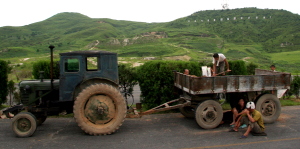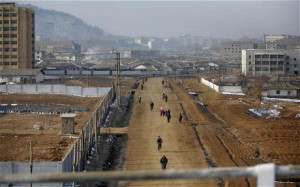
One would find these words as a madman’s statement if they weren’t expressed by George Soros’s former associate, who helped him running Quantum Fund. The fund during its existence gained the astonishing return of 4.200%
Despite the general opinion that foreign investors every now and then face various problems in North Korea and contracts don’t mean a lot, Jim Rogers claims that potential gains far exceed the risks involved.
Rogers as an American cannot directly participate in the North Korean market, but he invests in Korean coins and stamps anyway.
Foreign investors cannot invest in the stock exchange market because the post-Stalinist country abhors the speculators’ imperialistic tool as they call the stock exchange market. And even if not – it would be quite difficult to handle foreign transactions with perpetual lack of power supply.
When we think about North Korea the first things that come to our minds are those of concentration camps, poverty and the nightmare of Stalin’s ultra-communist system. In other words exact setting for Orwell’s ‘1984’ novel.
North Korea currently looks like China thirty years back.
It’s as surreal as the land from ‘Alice in Wonderland’. However, it does exist. If someone looked from a satellite at night at a scarcely lit piece of earth would not believe it. This resolves from the simple fact that Korean power houses have power supply problems and lightening of North Korea is compared to the lightening of a little town in South Korea.
“I advise not to use the elevators, especially if you hurry for the plane. Electricity can be cut at any time. And rule number one: never say anything disrespectful about Kim Jong Il and Kim Ir Sen. Also do not ask if the country already has got nuclear weapons” – says one of the regulars.
If one is not convinced to go on holiday to North Korea, fried dog’s meat served with pepper should do its part.
There are plenty of rumors about North Korea. It is said that in 1974 Korean Labor Party created ‘chamber of commerce’ called ‘room 39’.Originally ‘room 39’ was responsible for North Korean trade and natural recourses. Supposedly 39 is directly connected to Kim Jong II’s Office and associated with criminal organizations in Taiwan, China and Japan and probably in central Europe. It still officially deals with the export of natural resources such as gold, zinc and crops. However, most of the profit is generated by smuggling drugs and forgery. The profit made by North Korean operations associated with drug business is estimated at 500 million or even one billion dollars a year.
North Korea is opening to the world. At the moment it’s very clumsy and slow. Because how can you open to the world after years of living in Stalin’s utopia – it could lead to ‘doubt’ in North Korean faith in the infallible leader believed by many.
However, despite its underdevelopment DPRK has a lot to offer. That is why the investment ‘guru’ turned his attention to it. According to his doctrine- ” buy panic and hated markets ” now he turned towards the forgotten North Korea.
At the time when almost no one else saw the opportunity to invest in North Korea, it can be a very good opportunity for those who are able to take big risks. But maybe it’s worthwhile to look at disadvantages first.
Korean workers are very cheap and technically capable of working. However, there are a lot of obstacles for investment. In addition, we have problems with Human Right – the military arsenal Korea considers to be “the guarantor of the peace.” North Korea is not alone in this looking at the policy of the United States and Israel. These factors may, however, effectively cut off North Korea from the global financial system.
Rogers presents completely different point of view. He says:
“Asia has the potential to become the world’s next region of prosperity and China has the potential to become the next world hegemon. A unified Korea would equate to a 75 million-strong labor force and access to abundant natural resources, while the opening of new and strategically vital ports could facilitate rising trade and commerce flows. A trans-Siberian railway linking Seoul with Europe could then become reality”.

In addition, DPRK encourages many to invest there by creating foreign investment offices in different countries. The sign of the reforms is also creating three economic zones called: Rajin, Sinuju, Kaesong where investors don’t pay taxes. They employ North Koreans instead.
Due to the deep industrial underdevelopment DPRK is not going to compete with Japan or China. It will rather be the supplier of half-finished products, raw materials, spare parts, low-cost means of transport or light industrial products.
When it comes to China vs DPRK relations China annually provides DPRK with about 1.3 tons of oil, 2.5 tons of coal and 500 tons of grain. Half of these products are sent there as a gift and half goes there for half price. China’s help by sending food and fuel is one quarter of the total Chinese export to North Korea. This is how Chinese ‘feed’ the underdeveloped economy of DPRK and at the same time control and exploit it. At the end of the day it is more comfortable than the threat of DPRK’s economic collapse and the influx of thousands of immigrants to China.
One of the foreign entrepreneurs confesses that he pays his North Korean employees one-fifth of what he pays South Korean employed in his company, despite the fact that the work of the former ones is estimated at 60% productivity of the latter. Nonetheless the salary of the latter is only $ 160 a month.
There are different ways to invest in DPRK. One can do it buying stamps, coins, shares of companies which invest there or buy the North Korean bonds. The London Stock Exchange ‘ Exotix’ trades these papers.
“There are very few investments left in the world like this,The North Korean bonds are very cheap, they may rise on signs of improved international relations and they are easier to trade than the underlying loans” – said Andrew Chappell, head of London emerging market fixed-income for Exotix, a broker specializing in distressed securities.
One of the signs of change is agreeing by the DPRK ten-year economic development plan that includes twelve key sectors of the economy, such as: construction of roads, railways, industrial plants.
- Russia
Cooperation between Russia and DPRK also seems promising. The example here could be the building of 54 km of railway between the Siberian city of Khasan and Rajin in Korea where Moscow will support the modernization of the port.
Additionally , Russia and DPRK agreed to build the road connecting the two countries.
March 3, 2014 was held a meeting between representatives of Korea and delegates from Russia where the Koreans expressed their willingness to create a good ground for the operation of Russian companies. The talks focused on topics such as the simplified procedure for issuing multiple-entry visas, providing mobile communications and the Internet, as well as investment protection guarantee.
- China
China for many years lead the North Korean exploitation of mineral deposits. The value of imports from several years greatly increased, and according to official figures increased up to 860 million in 2010. Currently, more than half of the goods imported from North Korea to China are raw materials and fossilfuel. Mineral deposits in the country are considered to be one of the largest in the world.
China for many years exploits DPRK, now about half of importing goods from DPRK to China are fossil fuel and raw materials. Within 11 years the turnover between China and DPRK increased ten times from $ 500 million in 2000 to 5.6 billion in 2011. The share of the total international exchange between DPRK and CHINA from 20% in 2000 increased to 89% in 2011.
- Other countries
European companies use cheap IT sector in North Korea to web design, software for administration, mobile phones and computer games. European film studios use DPRK for outsourcing cartoon illustration.
Joint Ventures in North Korea come from Asia, Europe, Oceania and North America, but Chinese companies are the dominant investors. The European joint venture companies from Italy, Great Britain, Holland and Germany focus mainly on finance and technology. What is more, there are Thai and Egyptian companies that manage the telephone network system and mobile internet services.
Prognosis
The opening of North Korea to the world goes hand in hand with the interrelation with China which will lead to even greater dependence of DPRK from China. In contrast, the weakening of reinforcement tension in DPRK could push towards the influx of more foreign capital.
The building of economic zones and encouraging investors to invest in them is the repetition of the Chinese scenario from 30 years ago. This scenario has allowed China to acquire foreign capital and technological investments. This capital helped the rapid economic development of China. Will it be so in the case of Korea? Time will tell. Surely such a scenario is supported by the fact that their neighbor is rapidly growing. China growth is likely to move to North Korea. By contrast, economic ties between South and North Korea and their mutual markets also may contribute towards such a scenario.
However, there is no doubt, that North Korea is a huge untapped potential of underinvested rich mineral resources among the largest in the world. Skilled cheap labor force, the middle class with empty shelf which will be able to offer a market for consumer goods coming from outside.
Konrad Stachnio is an independent Poland based journalist, he hosted a number of radio and TV programs for the Polish edition of PrisonPlanet, exclusively for the online magazine “New Eastern Outlook”.
